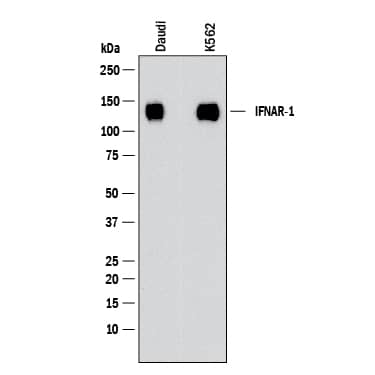Human IFN-alpha / beta R1 Antibody
Human IFN-alpha / beta R1 Antibody Summary
Gly26-Lys436
Accession # P17181
Applications
Please Note: Optimal dilutions should be determined by each laboratory for each application. General Protocols are available in the Technical Information section on our website.
Scientific Data
 View Larger
View Larger
Detection of Human IFN‑ alpha / beta R1 by Western Blot. Western blot shows lysates of Daudi human Burkitt's lymphoma cell line and K562 human chronic myelogenous leukemia cell line. PVDF membrane was probed with 2 µg/mL of Rabbit Anti-Human IFN‑ alpha / beta R1 Monoclonal Antibody (Catalog # MAB2452) followed by HRP-conjugated Anti-Rabbit IgG Secondary Antibody (Catalog # HAF008). A specific band was detected for IFN‑ alpha / beta R1 at approximately 120 kDa (as indicated). This experiment was conducted under reducing conditions and using Western Blot Buffer Group 1.
 View Larger
View Larger
Detection of IFN‑ alpha / beta R1 in U937 cells by Flow Cytometry. U937 cells were stained with Rabbit Anti-Human IFN‑ alpha / beta R1 Monoclonal Antibody (Catalog # MAB2452, filled histogram) or isotype control antibody (Catalog # MAB1050, open histogram), followed by Allophycocyanin-conjugated Anti-Rabbit IgG Secondary Antibody (Catalog # F0111). View our protocol for Staining Membrane-associated Proteins.
Reconstitution Calculator
Preparation and Storage
- 12 months from date of receipt, -20 to -70 °C as supplied.
- 1 month, 2 to 8 °C under sterile conditions after reconstitution.
- 6 months, -20 to -70 °C under sterile conditions after reconstitution.
Background: IFN-alpha/beta R1
Interferon‑alpha/beta receptor 1 (IFN‑ alpha / beta R1), also known as IFNAR1, is a 100‑130 kDa member of the class II cytokine receptor family of proteins. These proteins form heterodimeric receptor complexes that mediate class II cytokine signals. Subunits of the different receptor complexes are shared and serve multiple functions (1). IFN‑ alpha / beta R1, in association with IFN‑ alpha / beta R2, is required for propagating anti‑microbial signal transduction triggered by the type 1 interferons such as IFN‑ alpha and IFN‑ beta (2, 3). Mature human IFN‑ alpha / beta R1 consists of a 409 aa extracellular domain (ECD), a 21 aa transmembrane segment, and a 100 aa cytoplasmic domain (4). The ECD contains three tandem fibronectin type III repeats and is extensively glycosylated. Within the ECD, human IFN‑ alpha / beta R1 shares 47% and 50% aa identity with mouse and rat IFN‑ alpha / beta R1, respectively. Alternative splicing generates two additional isoforms that lack the transmembrane segment and either all or a portion of the cytoplasmic domain. IFN‑ alpha / beta R1 interacts very weakly or not at all with type 1 interferons and does not stably interact with IFN‑ alpha / beta R2. Ligands preferentially associate with IFN‑ alpha / beta R2, and this complex subsequently forms a stable ternary assembly with IFN‑ alpha / beta R1 (5‑7). IFN‑ alpha / beta R1 also associates with IFN‑ gamma R2 even in the absence of IFN‑ gamma stimulation (3). IFN‑ alpha / beta R1 activation depends on tyrosine phoshorylation as well as palmitoylation of its cytoplasmic domain (8, 9). Rapid down‑regulation of the receptor is accomplished by ligand‑dependent or ‑independent pathways (e.g. VEGF R signaling, TLR signaling, or cellular stress) which induce its serine phosphorylation, ubiquitination, and degradation (10‑13).
- Langer, J.A. et al. (2004) Cytokine Growth Factor Rev. 15:33.
- Hwang, S.Y. et al. (1995) Proc. Natl. Acad. Sci. USA 92:11284.
- Takaoka, A. et al. (2000) Science 288:2357.
- Uze, G. et al. (1990) Cell 60:225.
- Lamken, P. et al. (2004) J. Mol. Biol. 341:303.
- Arduini, R.M. et al. (1999) Prot. Sci. 8:1867.
- Kalie, E. et al. (2008) J. Biol. Chem. 283:32925.
- Platanias, L.C. (2005) Nat. Rev. Immunol. 5:375.
- Claudinon, J. et al. (2009) J. Biol. Chem. 284:24328.
- Zheng, H. et al. (2011) Blood 118:4003.
- Qian, J. et al. (2011) PLoS Pathogens 7:e1002065.
- Bhattacharya, S. et al. (2010) J. Biol. Chem. 285:2318.
- Bhattacharya, S. et al. (2011) J. Biol. Chem. 286:22069.
Product Datasheets
FAQs
No product specific FAQs exist for this product, however you may
View all Antibody FAQsReviews for Human IFN-alpha / beta R1 Antibody
There are currently no reviews for this product. Be the first to review Human IFN-alpha / beta R1 Antibody and earn rewards!
Have you used Human IFN-alpha / beta R1 Antibody?
Submit a review and receive an Amazon gift card.
$25/€18/£15/$25CAN/¥75 Yuan/¥2500 Yen for a review with an image
$10/€7/£6/$10 CAD/¥70 Yuan/¥1110 Yen for a review without an image

